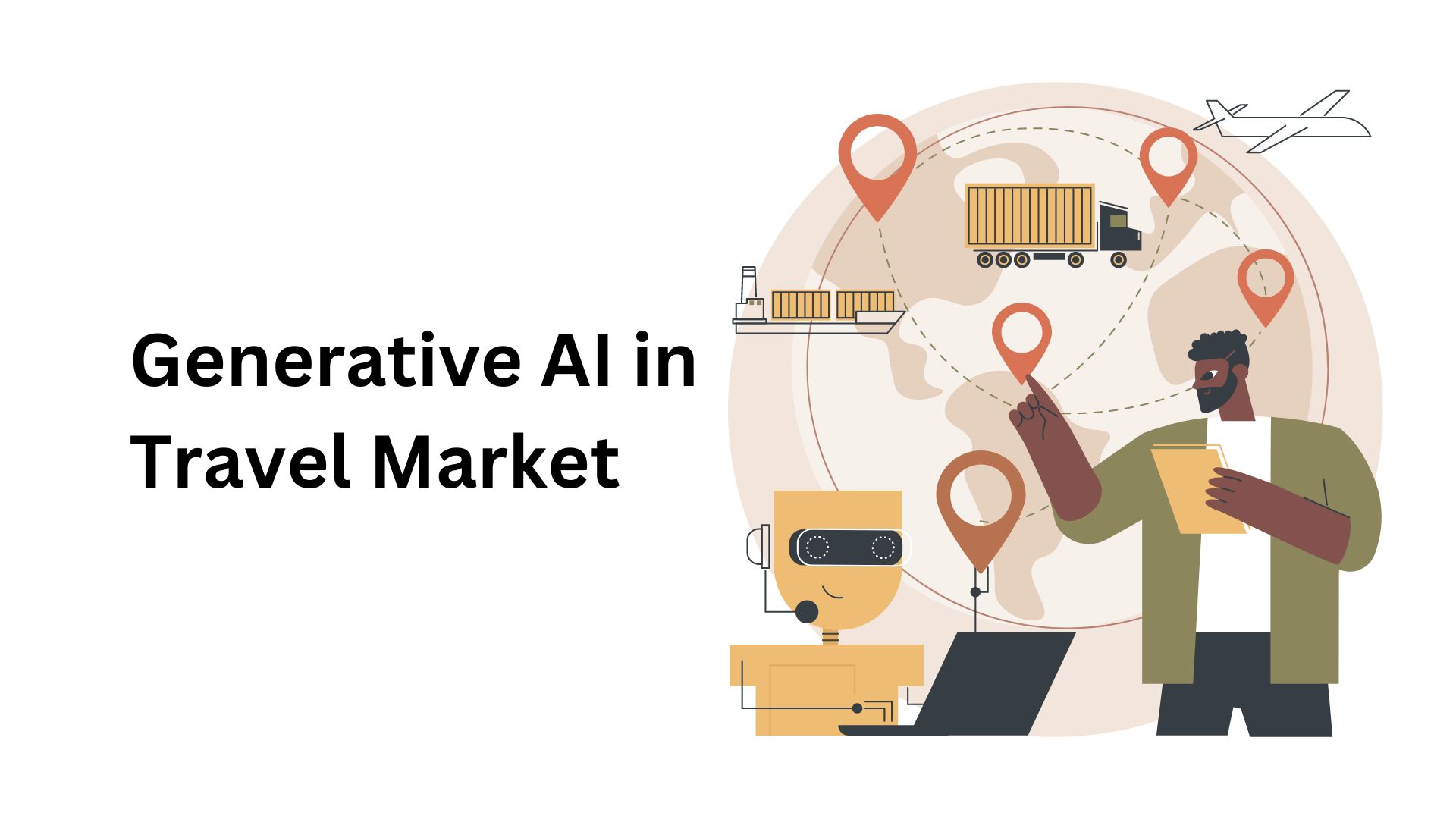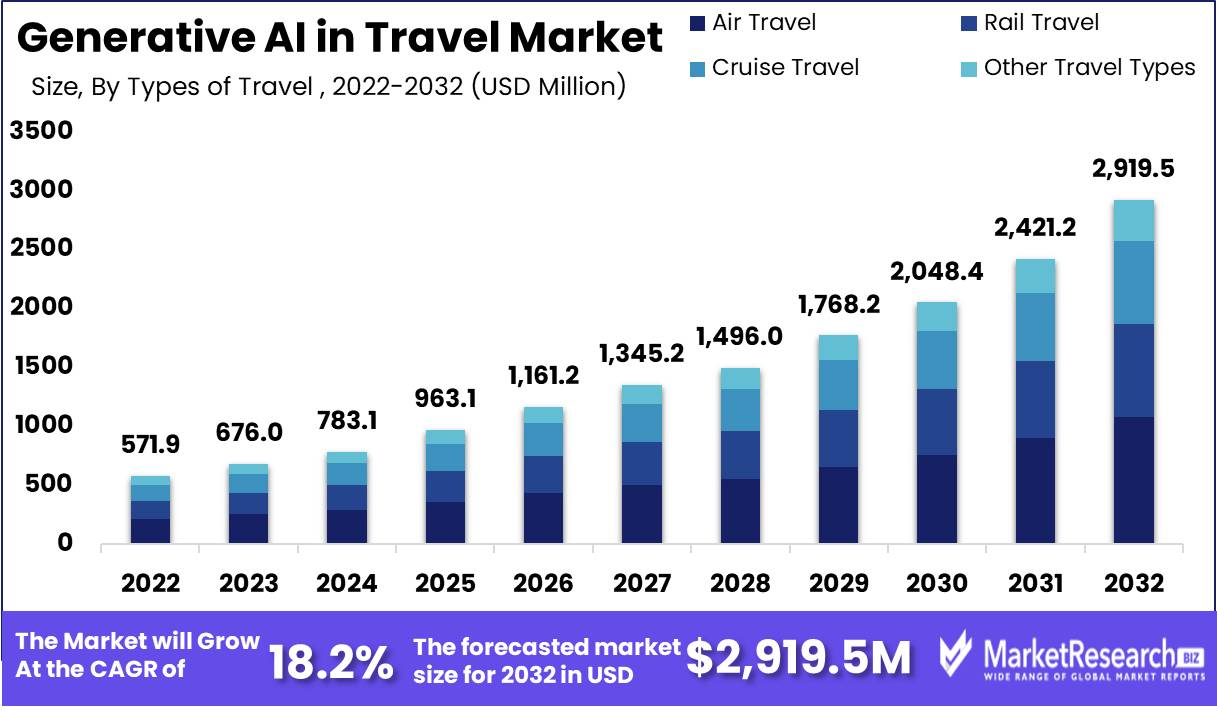Generative AI in Travel Market to Surpass USD 2,919.5 Mn by 2032

Page Contents
Market Overview
Published Via 11Press : Global Generative AI in Travel Market size is expected to be worth around USD 2,919.5 Mn by 2032 from USD 571.9 Mn in 2022, growing at a CAGR of 18.2% during the forecast period from 2023 to 2032.
Generative AI has revolutionized various aspects of travel industry and greatly enhanced customer experiences, especially trip planning and booking. One area where this advancement stands out is trip planning/booking. Utilizing vast amounts of data such as customer preferences, historical trends and real-time updates, generative AI algorithms can access to analyze and provide personalized travel recommendations. Generic AI recommendations provide personalized suggestions tailored to a traveler's interests, budget and schedule – offering tailored suggestions can simplify trip planning process while aiding travelers make informed decisions.
Generational AI is revolutionizing how travelers experience travel destinations. For instance, virtual and augmented reality technologies powered by this artificial intelligence enable immersive travel experiences, including VR/AR technologies to offer virtual tours of landmarks/attractions before booking trips based on that research. Furthermore, Generative AI simulates different scenarios/environments so travellers can virtually experience cultural events, historical moments or natural phenomenon before visiting physically.
Generative AI plays an integral part in providing personalized recommendations and improving customer service in the travel industry. By analyzing user data such as travel preferences, reviews and social media interactions generative AI algorithms can generate tailored recommendations based on individual tastes for activities, restaurants and attractions to enhance an exceptional travel experience and ensure increased customer satisfaction. This level of customization enhances overall travel satisfaction for everyone involved and increases overall travel satisfaction levels.
Request Sample Copy of Generative AI In Travel Market Report at: https://marketresearch.biz/report/generative-ai-in-travel-market/request-sample/
Key Takeaways
- Generative AI makes trip planning and booking faster by analyzing data to generate personalized travel recommendations.
- Virtual and augmented reality powered by generative AI can offer travelers immersive pre-travel experiences, allowing them to virtually explore destinations before actually visiting them.
- Generative AI enhances customer service by offering tailored recommendations based on user preferences and social media interactions.
- Chatbots equipped with AI algorithms provide real-time customer assistance throughout their travel experience.
- Generative AI allows travelers to virtually experience cultural or historical moments virtually.
- Personalized recommendations generated through AI algorithms enhance traveler experiences and increase customer satisfaction.
- Generative AI continues to gain popularity within the travel market, promising further advancement and innovations over time.
Regional Snapshot
North America: Travel companies across North America rely heavily on generative AI for trip planning and booking processes, with AI-powered platforms analyzing large amounts of data to generate personalized trip recommendations based on factors like user preferences, budget constraints and historical trends. Virtual reality technologies also play an integral role, providing travelers the chance to virtually explore destinations and attractions before planning trips themselves.
Europe: European travel companies are turning to generative AI to improve customer service and tailor recommendations, offering instantaneous responses through virtual assistants equipped with these algorithms as chatbots handle customer inquiries with instant responses while aiding with assistance throughout their trip journey. Furthermore, generative AI algorithms analyze customer data in order to deliver personalized recommendations regarding accommodations, activities, dining and so forth.
Asia Pacific travel markets have witnessed AI transform the travel sector thanks to advanced language processing capabilities that support numerous languages and cultural traditions. Chatbots powered by artificial intelligence provide customer support in different languages while Generative AI also plays a vital role in providing personalized recommendations based on cultural affinities or regional attractions.
Generative AI has quickly made waves in Latin American travel markets, revolutionizing trip planning and booking processes. Travel companies use AI algorithms to analyze historical customer preferences and tailor recommendations based on them for destinations, accommodations and activities; virtual reality technology powered by generative AI allows travelers to take virtual tours of popular attractions or landmarks.
Middle East and African customers benefit from using generative AI to personalize customer experiences with tailored recommendations and immersive pre-travel experiences. AI platforms analyze user data to suggest destinations, accommodations and activities tailored specifically to individual preferences; virtual and augmented reality technologies offer virtual tours or simulations of cultural events or historical sites.
For any inquiries, Speak to our expert at: https://marketresearch.biz/report/generative-ai-in-travel-market/#inquiry
Drivers
Generative AI allows travel companies to offer highly tailored customer experiences by analyzing vast amounts of customer preferences, behaviors and historical trends gathered through data analytics tools like Generative AI. By employing powerful algorithms that learn their customers' preferences over time and generate suggestions based upon this analysis for destinations, accommodations and activities to add a higher degree of personalization into customers' experiences and increase customer satisfaction levels. This level of customization enhances customer journeys while elevating satisfaction ratings among travellers.
- Efficiency and Automation: Generative AI has revolutionized various processes within the travel industry. From trip planning and booking, customer support and communication services to trip cancellation management systems – AI-powered systems have simplified many travel tasks more efficiently saving both time and resources allowing companies to provide greater service while reaching more customers with exceptional experiences.
- Advanced-Data Analysis: Generative AI algorithms have the capacity to quickly process large volumes of data in real-time, offering travel companies valuable insight into customer behavior, market trends and competitive landscape. By taking this data-driven approach to decision-making and optimizing offerings they are better placed than their competition to make informed decisions that improve service offerings in an ever-competitive market environment.
- Technological Developments: Recent advances in AI technologies like machine learning and deep neural networks have drastically advanced generative AI systems' abilities, providing for more precise data analysis, natural language processing and realistic content generation. Furthermore, as AI continues to advance it opens up exciting possibilities within travel industry applications.
Restraints
- Data Privacy and Security Concerns: Generative AI usage within the travel industry requires collecting and analyzing large volumes of personal and sensitive data that raises concerns for its privacy and security. Travel companies must put into effect stringent data protection measures that safeguard customer information while complying with privacy regulations.
- Ethical Considerations: Generative AI algorithms generate content based on patterns and data analysis, but ethics considerations related to accuracy, fairness and potential bias in their output must also be taken into account in their recommendations and content creation processes. Transparency and accountability within AI algorithms must ensure customer trust are preserved for continuous functioning of these programs.
- Adoption Challenges: Integrating AI systems into existing travel platforms and workflows may present some unique implementation issues for companies. Companies could experience difficulty adapting infrastructure, training employees on how to use AI-powered processes effectively and managing any transition requirements necessary to transition away from legacy processes towards AI processes. Overcoming such adoption hurdles takes careful planning and investment from management.
Opportunities
Generative AI algorithms have the capacity to analyze large amounts of customer data in order to provide highly tailored travel recommendations, creating opportunities for travel companies that want to deliver tailored offerings, provide customized experiences and cultivate stronger customer relationships.
- Virtual Experiences: Virtual reality (VR) and augmented reality (AR) technologies powered by generative AI create immersive travel experiences for travelers. Travelers can virtually explore destinations, landmarks, and attractions and create virtual tours, marketing campaigns using VR technology, as well as experiences that bridge the gap between planning travel plans and actual journeying experiences.
- Intelligent Chatbots and Virtual Assistants: AI-powered chatbots and virtual assistants offer 24/7 customer support, instant responses and personalized assistance – freeing up human resources while improving overall customer experiences. Conversational agents powered by artificial intelligence allow these conversational agents to manage customer inquiries, provide real-time data feeds and offer recommendations all while streamlining customer services operations and creating the optimal customer journey experience.
- Predictive Analytics: Generative AI algorithms can analyze historical travel data to provide invaluable insight for travel companies. By harnessing predictive analytics, companies can forecast demand, optimize pricing strategies and identify emerging travel trends to make data-driven decisions and remain competitive within their marketplace.
Take a look at the PDF sample of this report: https://marketresearch.biz/report/generative-ai-in-travel-market/request-sample/
Challenges
- Trust and Acceptance of Generative AI Systems: Fostering user trust is integral to AI-powered systems' effectiveness; users need to feel assured by the accuracy, reliability, and privacy protection offered by AI-powered recommendations. Effective communication and transparency may address users' concerns and help build more of it over time.
- Continuous Learning and Improvement: For successful and accurate recommendations to travelers, AI models need constant refinements. Their output must adjust with changing traveler tastes and market demands in real-time; ongoing updates must take place so the AI systems remain relevant while offering accurate suggestions at any point in time.
- Bias and Fairness: AI systems may unintentionally reinforce any bias present in their data sources by producing biased recommendations or content generation. Ensuring fairness in AI algorithms is imperative in providing equitable experiences to travelers from diverse backgrounds.
- Limited Interpretability: Artificial intelligence can often be difficult to interpret and explain, creating challenges in comprehending why AI recommendations were generated in the first place. Therefore, methods must be found that increase transparency and explainability for AI recommendations generated.
Market Segmentation
Based on Type of Travel
- Air Travel
- Rail Travel
- Cruise Travel
- Other Types of Travels
Based on Service Type
- Transportation Services
- Accommodation Services
- Other Service Types
Based on Deployment Model
- On-Premise based Model
- Cloud-Based Model
- Hybrid Model
Key Players
- Amadeus IT Group
- Google LLC
- Airbnb Inc.
- Expedia Group Inc.
- Skyscanner Ltd.
- Kayak Software Corporation
- Sabre Corporation
- Booking Holding Inc.
- Other Key Players
Report Scope
| Report Attribute | Details |
| Market size value in 2022 | USD 571.9 Mn |
| Revenue Forecast by 2032 | USD 2,919.5 Mn |
| Growth Rate | CAGR Of 18.2% |
| Regions Covered | North America, Europe, Asia Pacific, Latin America, and Middle East & Africa, and Rest of the World |
| Historical Years | 2017-2022 |
| Base Year | 2022 |
| Estimated Year | 2023 |
| Short-Term Projection Year | 2028 |
| Long-Term Projected Year | 2032 |
Request Customization Of The Report: https://marketresearch.biz/report/generative-ai-in-travel-market/#request-for-customization
Recent Developments
- AI-Powered Travel Assistants and Chatbots: Travel companies have increasingly invested in AI-powered travel assistants and chatbots as a means of increasing customer support and engagement. These assistants use generative AI algorithms to respond instantly to customer inquiries, offer tailored suggestions for booking modifications or itinerary planning assistance and offer any necessary travel-related information instantly.
- Generative AI has greatly assisted with creating immersive Virtual and Augmented Reality experiences in travel. When combined with VR/AR technologies, travelers can virtually explore destinations virtually, visit landmarks and attractions virtually, simulate cultural events and historical moments virtually and more!
- Generative AI algorithms have made significant advances in creating realistic images and content related to travel destinations, creating lifelike visual representations of landmarks, landscapes and accommodations so travelers can gain a clearer picture of their desired travel spots.
- Natural Language Processing (NLP) for Customer Interactions: Recent advancements in NLP have allowed artificial intelligence systems to better recognize natural language queries and interactions, providing travel companies with more conversational and personalized customer experiences while giving travelers more intuitive interaction with AI systems. Chatbots powered by NLP are used by travel companies as virtual assistants so travelers can interact more seamlessly and naturally with AI-powered chatbots or assistants utilizing NLP technologies – offering travelers more intuitive interactions.
FAQ
What does Reactive AI offer the travel market?
Generative AI in travel refers to using artificial intelligence algorithms – particularly generative models – for data analysis, content creation and providing personalized recommendations and experiences to travelers.
How does Generative AI facilitate travel planning?
Generative AI analyzes an abundance of data relating to customer preferences, historical trends and real-time events to generate personalized travel suggestions tailored specifically for an individual traveller's interests, budget and schedule – making trip planning simpler! It suggests destinations, accommodations, flights and activities which align with these parameters in order to optimize trip planning processes and speed them along.
Can AI create virtual travel experiences?
Yes, generative AI can create immersive virtual travel experiences. By harnessing technologies like virtual reality and augmented reality (VR/AR), this technology enables travelers to virtually explore destinations, landmarks and attractions virtually before departing on their trip.
What impact has Generative AI had on customer service in the travel industry?
Generative AI enhances customer service in the travel industry by offering tailored recommendations based on individual user preferences and analyzing reviews/social media interactions data. AI-powered chatbots can manage customer inquiries instantly providing instant responses as well as assistance throughout their trip journey.
Are there any ethical concerns related to using AI for travel purposes?
Absolutely there are ethical considerations regarding AI's application in travel marketing. These may include issues surrounding privacy, security, data biasing and fairness when providing recommendations or content generated from AI algorithms. It is imperative that we address such considerations to ensure transparency, accountability and protect traveler rights.
How does Artificial Intelligence contribute to immersive travel experiences?
Generative AI can enhance travel experiences through simulating various scenarios and environments, recreating cultural events, historical moments or natural phenomenon virtually, providing travelers with immersive and interactive travel experiences without necessarily physically being present at them.
Can AI algorithms be integrated with existing travel platforms?
Yes, generative AI algorithms can easily be integrated into existing travel platforms. Booking platforms could utilize AI-powered booking options to analyze user data and offer optimized itineraries, personalized pricing options and additional services based on these insights. Ensure a successful implementation through careful planning, infrastructure upgrades, training programs or professional implementation support services.
Contact us
Contact Person: Mr. Lawrence John
Marketresearch.Biz
Tel: +1 (347) 796-4335
Send Email: [email protected]
Content has been published via 11press. for more details please contact at [email protected]
The team behind market.us, marketresearch.biz, market.biz and more. Our purpose is to keep our customers ahead of the game with regard to the markets. They may fluctuate up or down, but we will help you to stay ahead of the curve in these market fluctuations. Our consistent growth and ability to deliver in-depth analyses and market insight has engaged genuine market players. They have faith in us to offer the data and information they require to make balanced and decisive marketing decisions.




